2012版新目标英语七年级下册Unit 2 What time do you go to school测试题
新目标七年级下Unit 2 What time do you go to school?( sectionA)
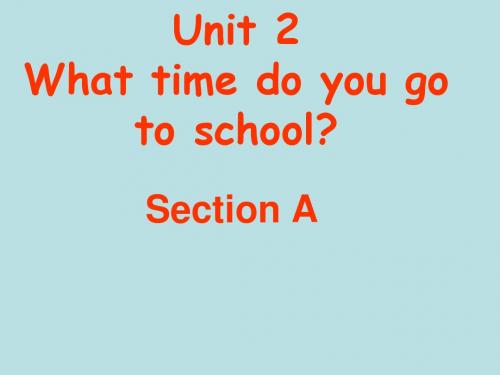
eat breakfast
What time do you usually eat breakfast? I usually eat
breakfastat seven o’clock .
go to school
What time do you usually go to school? I usuallygo to school at seven thirty _____________
18:00
What time is it , please? It’s three ten .
What time is it , please? It’s three forty-five .
What time is it , please? It’s seven twenty .
What time is it , please? It’s nine twenty-five .
have five classes in the morning. And then I have lunch at . In the afternoon I have two . I get home at
classes. I go home at
4:30p.m. I
I . I
at about
at
Rick’s family shower’s time
2b
Listen , complete the schedule.
Time 5:00 6:00 7:00 8:00 9:00 Name Bob
Mary
Jerry Rick Alicia
Read the passage. Then match the pictures with the correct clocks.
新目标英语七下unit 2whattimedoyougotoschool必背知识点重点短语和句子
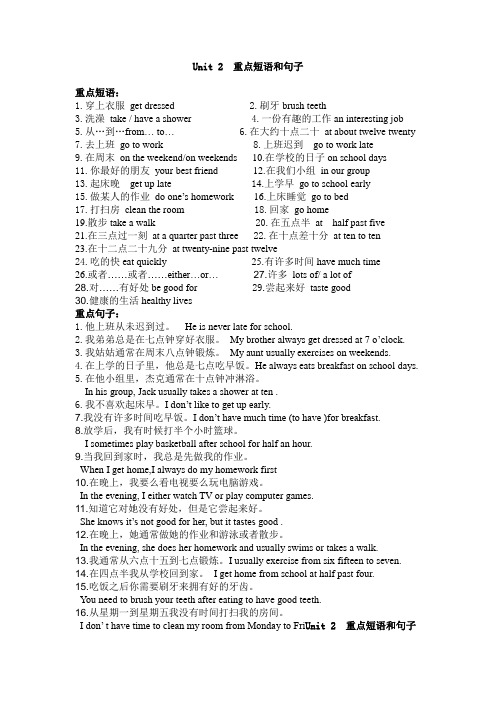
Unit 2 重点短语和句子重点短语:1.穿上衣服get dressed2.刷牙brush teeth3.洗澡take / have a shower4.一份有趣的工作an interesting job5.从…到…from… to…6.在大约十点二十at about twelve twenty7.去上班go to work8.上班迟到go to work late9.在周末on the weekend/on weekends 10.在学校的日子on school days11.你最好的朋友your best friend 12.在我们小组in our group13.起床晚get up late 14.上学早go to school early15.做某人的作业do one’s homework 16.上床睡觉go to bed17.打扫房clean the room 18.回家go home19.散步take a walk 20.在五点半at half past five21.在三点过一刻at a quarter past three 22.在十点差十分at ten to ten23.在十二点二十九分at twenty-nine past twelve24.吃的快eat quickly 25.有许多时间have much time26.或者……或者……either…or…27.许多lots of/ a lot of28.对……有好处be good for 29.尝起来好taste good30.健康的生活healthy lives重点句子:1.他上班从未迟到过。
He is never late for school.2.我弟弟总是在七点钟穿好衣服。
My brother always get dressed at 7 o’clock.3.我姑姑通常在周末八点钟锻炼。
My aunt usually exercises on weekends.4.在上学的日子里,他总是七点吃早饭。
2012版新目标初一下册英语第二单元What_time_do__you_go_to_school

Can you say out the following numbers quickly?
four thirty eleven fourteen twenty fifty-seven
thirty-three
forty
six
eighteen twenty-one
thirty-nine
fifty-eight
It is around two seven.
What time is it? It’s two five .
What time is it? It’s seven fifteen .
What time is it? It’s seven twenty .
What time is it? It’s ten twenty-five .
Events get up run have breakfast 5:00 6:00 7:00 Time
take a shower
go to school
8:00
9:00
1c Make dialogues with your partner after the example.
Example:
A: What time do you usually get up? B: I usually gets up at half past six.
A:
get up? What time do you
take a shower? eat breakfast?
...B:ຫໍສະໝຸດ get up6:00
I
take a shower
at …
eat breakfast …
What time is it? It’s eight thirty-five .
人教新目标Go For It!(2012)初中英语七年级下册Unit 2 What time do
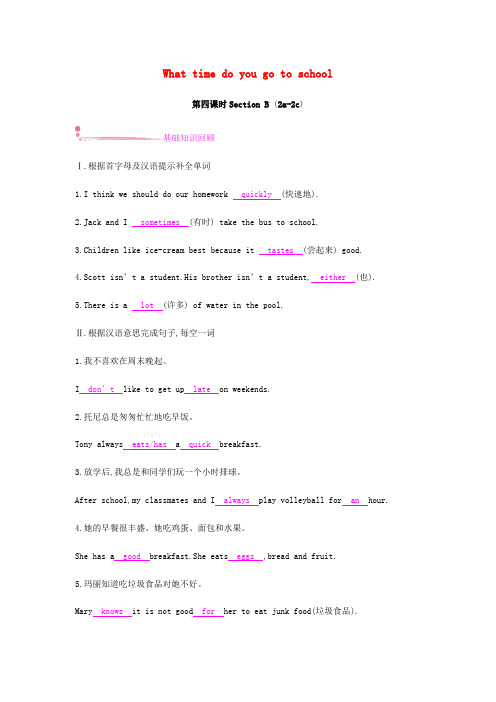
What time do you go to school第四课时Section B (2a-2c)基础知识回顾Ⅰ.根据首字母及汉语提示补全单词1.I think we should do our homework quickly (快速地).2.Jack and I sometimes (有时) take the bus to school.3.Children like ice-cream best because it tastes (尝起来) good.4.Scott isn’t a student.His brother isn’t a student,either (也).5.There is a lot (许多) of water in the pool.Ⅱ.根据汉语意思完成句子,每空一词1.我不喜欢在周末晚起。
I don’t like to get up late on weekends.2.托尼总是匆匆忙忙地吃早饭。
Tony always eats/has a quick breakfast.3.放学后,我总是和同学们玩一个小时排球。
After school,my classmates and I always play volleyball for an hour.4.她的早餐很丰盛。
她吃鸡蛋、面包和水果。
She has a good breakfast.She eats eggs ,bread and fruit.5.玛丽知道吃垃圾食品对她不好。
Mary knows it is not good for her to eat junk food(垃圾食品).Ⅲ.按要求完成句子,每空一词1.Dave usually takes a walk after dinner.(改为一般疑问句) Does Dave usually take a walk after dinner?2.She often goes to park on Sundays.(对画线部分提问) When does she often go to the park?3.Keke never eats vegetables for breakfast.(改为同义句) Keke doesn’t eat vegetables for breakfast.4.It is ten forty-five now.(改为同义句)It is a quarter to eleven now.5.When does Tony play sports?(改为同义句)What time does Tony play sports?Ⅳ.连词成句1.he,much,doesn’t,time,have,breakfast,for(.)He doesn’t have much time for breakfast.2.I,always,when,home,I,get,homework,my,first,do(.)I always do my homework first when I get home.3.weekends,either,TV,I,play,watch,on,games,or,computer(.)I either watch TV or play computer games on weekends.4.dinner,does,takes,she,after,walk,a,her,or,homework,usually(.) After dinner she usually takes a walk or does her homework.5.at,Anna,ten,to,goes,twenty,usually,bed(.)Anna usually goes to bed at ten twenty.综合能力提升Ⅰ.单项填空(C)1.What timeMr.and Mrs.Browndinner?A.do;hasB.does;hasC.do;haveD.does;have(B) 2.My mother seldomat 5:30 p.m.A.gets to homeB.gets homeC.get to homeD.get home(B) 3.My sister doesn’t like meat.I don’t like meat,.A.alsoB.eitherC.tooD.well(A) 4.I sometimes play the violin forhour.A.half anB.an halfC.a halfD.half a(D) 5.He eitherfootball orwalks in the evening.A.play;takeB.plays;takeC.play;takesD.plays;takesⅡ.用方框中所给词的适当形式完成短文Nowadays teenagers(青少年) need to have a healthy habit.My son is in Grade Eight.During summer holidays he 1.has some bad habits.In the morning,he always gets up 2.at ten o’clock.He 3.never eats breakfast.Because lunchtime is coming.He doesn’t eat any food for many 4.hours .So he is hungry and he eats more and 5.quickly .And he doesn’t like vegetables or fruit.He usually eats instant noodles(方便面).After lunch he 6.either watches TV 7.or plays computer games.He never 8.takes a walk.He doesn’t play sports.So he is heavy.At seven in the evening,he begins 9.to do his homework until ten.His eyesight(视力) is poor.He 10.goes to bed at midnight(半夜).。
人教版新目标英语七年级下(2012新版)Unit2_What_time_do_you_go_to_school_Period1A2
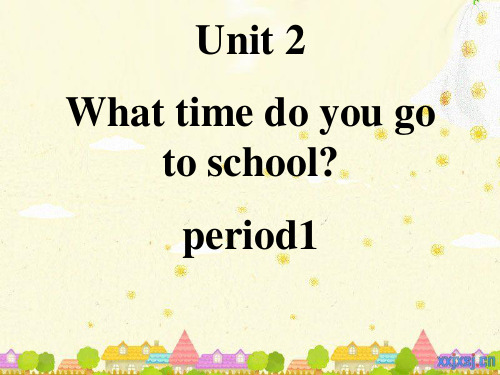
4. What time does Rick usually get dressed?
He usually gets dressed at seven twenty. 5. What time does Rick usually go to school?
He usually goes to school at seven thirty.
___ ____ does she do her homework?
She ______ her _______ at 7:00.
Thank you!
Good Bye!
6:30
1. What time does Rick usually get up?
He usually gets up at six thirty.
2. What time does Rick usually brush teeth and take a shower?
He usually brushes teeth and takes a shower at six forty. 3. What time does Rick usually eat breakfast? He usually eats breakfast at seven o’clock.
6:05 six O five
6:15 six fifteen 6:30 six thirty 6:45 six forty-five
6:55 six fifty-five
逆读法: (1) 分钟数为30, ….点半: 6:30 5:30 6:05 half past six half past five five past six
What time is it ?
七年级新目标下Unit_2_What_time_do_you_go_to_school教案
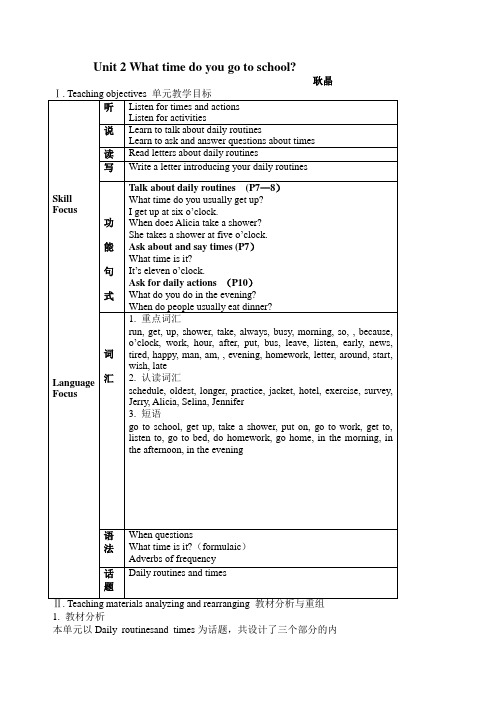
Unit 2 What time do you go to school?耿晶1. 教材分析本单元以Daily routinesand times为话题,共设计了三个部分的内容。
旨在通过单元教学使学生学会谈论日常行为、询问并答复有关时间的问题、询问并回答人们在特定时间所从事的活动。
Section A 学习谈论日常作息时间。
1a, 1b, 1c 重点学习和学生息息相关的几种日常行为的英文表示方法,学会询问和答复日常作息时间。
2a, 2b, 2c ,2d继续学习谈论自己或他人的日常作息时间。
重点学习如何询问,这也是本单元的语法重点。
3a, 3b, 3c 学会叙述他人的日常活动安排,同时学习询问时间和时间表达法,进一步巩固询问别人的日常作息时间的表达法。
Section B 继续学习询问和谈论别人的日常行为。
1a, 1b, 2a, 1c,1d,1e,学会谈论和询问一天内各个时间段的活动安排。
2a,2b,3a,3b学会通过两个人的对比介绍来判断并养成好的作息时间。
Self check 重点单词句型复习2. 课型设计与课时分配Period 1 Listening and speaking (I)(Section A: 1a, 1b, 1c)Period 2 Listening and speaking (II)(Section A:2a, 2b, 2c,2d)Period 3 Integrating skills(Section A:3a, 3b, 3cSection B: 1a, 1b,1c,1d,1e)Period 4 Reading and writing(Section B:2a, 2b, 2c,3a,3b)Period 5 Self checkⅢ. Teaching plans for each periodPeriod 1 Listening and speaking(Ⅰ) Target language目标语言1. Words && phrases生词和短语Up,get up,dress,get dressed,brush,tooth,shower,take a shower,usually,forty, what time,2. Key sentences重点句子When do people usually ...? People usually ...What time do you usually ...? I usually ...Ability goals能力目标Enable students to learn to talk about daily routines.Learning ability goals学能目标Help the students learn how to talk about daily routines.Teaching important / difficult points教学重难点How to talk about daily routines.Teaching aids教具准备A tape recorder and a model clock.Teaching procedures and ways教学过程与方式Step ⅠWarming upIn this procedure, motivate students to learn some words and phrases by singing the songs they’ve learned before.T: Good morning, everyone. (sing) “Good morning to you. Good morning to you. Good morning, dear children. Good morning to you.” This song is easy to learn. Who can sing it to us?Encourage students to sing the song.T: Well done. Thank you! We sing “Good morning to you” in the morning. Then what do we sing in the afternoon and in the evening? S: We sing Good afternoon to you in the afternoon and Good evening to you in the evening.T: That’s right. I know all of you are very good at singing. Does anyone want to sing Good afternoon to you or Good evening to you to us?Step ⅡTalking and reading (1a)In this procedure, ask students to finish the required task and learn some key phrases about daily actions.T: As we all know, time is very important and in English there is a famous saying "An hour in the morning is worth two in the evening." So what do you do in the morning?S1: I read English. S2: I do morning exercise.T: And what do you do in the afternoon and in the evening?S1: I play basketball in the afternoon. S2: I watch TV in the evening.T: I’m very glad to hear that. You use your time very well. And there’re many daily things we can do. Now let’s read these phrases in 1a and match these actions and the time of day.Step ⅢPracticeIn this procedure, students will learn how to talk about actions and the time of day.T: I know you’re very clever. Now I want you to tell if my statements are right or wrong. First, I usually eat dinner in the morning. S: Wrong.T: When do I usually eat dinner? S: In the evening.T: Second, she gets up at 19:00 in the morning. S: Wrong.T: What is the correct way of saying the sentence? S: She gets up at 7:00 in the morning.T: How clever you are! Now let’s read the conversation in groups and see which group reads better.Ask students to do pairwork.T: Please ask your partner when people usually do these things: do homework, eat dinner, eat breakfast and go to bed.(Write “When do people usually ...”on the blackboard)Sample dialogue:S1: When do people usually do homework?S2: People usually do homework in the afternoon.Interest the students in going on practicing the conversation using a new way of reading.T: Now let’s try a new way of reading. First I name one student to ask a question, and then ask all of you repeat this question together. After that, I name another student to answer this question, and all of you repeat the answer together.Sample dialogue:S1: When do people usually go to bed?S: When do people usually go to bed?S2: People usually go to bed in the evening.S: People usually go to bed in the evening.Step ⅣTalking about time (1c)In this procedure, students will learn how to ask about and say hour times and learn some key phrases about daily routines.T: Boys and girls, please listen to what I’m saying and guess what it is. 小小骏马不停蹄,日日夜夜不休息,蹄声哒哒似战鼓,提醒人们争朝夕。
人教新目标七年级英语下册课堂笔记Unit 2 What time do you go to

Unit 2 What time do you go to school?2012版人教新目标七年级英语下册课堂笔记1. upadv. 向上n 反义词:down nget up起床nstand up起立Please lift your head up.2. dress v. 穿衣服n. 连衣裙n复数:dressesn get dressed穿上衣服My daughter is too young to dress herself.3. brush v. 刷;刷净n. 刷子n 复数:brushes n 单三: brushes nwipe擦nsweep扫nrub摩擦nscrape刮掉You have to brush your shoes now.4. toothn. 牙齿n 复:teeth nbrush teeth刷牙ntoothpick牙签ntoothpaste牙膏ntoothbrush牙刷The baby has two teeth.常见的可数名词单数变复数时不规则变化的名词有: man, woman, child, foot, mouse, tooth 等。
我们可以用这样一句话来记忆这些单词“男女孩子的脚踩住老鼠的牙”5. shower n. & v. 淋浴,(名)淋浴器n 近: bath 洗澡,沐浴ntake/have a shower洗澡nshower下阵雨,倾注;阵雨,大量倾泻nshow给……看You’d better take a shower.6. usually adv. 通常地,一般地Do you usually go to the park?n unusually异乎寻常地7. fortynum. 四十n 表示“几十”的数字都以-ty结尾。
n词形特殊的有:twenty, thirty, forty, fifty, eighty.nfour四nfourteen十四There are 40 students in Class One.8. never adv. 从不; 绝不n Better late than never.迟做总比不做好。
七年级英语下册 Unit 2 What time do you go to school Secti

七年级英语下册 Unit 2 What time do you go to school Section A(第1课时)说课稿一. 教材分析《新目标》七年级英语下册Unit 2 What time do you go to school Section A(第1课时)主要讨论日常生活中的一般现在时。
本节课主要介绍一般现在时的构成和用法,以及如何用一般现在时描述日常生活中的习惯和规律。
教材通过丰富的情境和真实的语境,让学生在实践中掌握一般现在时的基本知识,提高运用英语进行交流的能力。
二. 学情分析面对七年级的学生,他们已经掌握了一定的英语基础,能够进行简单的英语交流。
但同时,他们还在适应初中英语的学习节奏,需要更多的鼓励和引导。
针对这个年龄段的学生,我们需要设计富有激情和互动性的课堂,充分调动他们的学习积极性。
三. 说教学目标1.知识目标:学生能够掌握一般现在时的构成和基本用法,理解主语和动词之间的关系。
2.能力目标:学生能够在适当的情境中运用一般现在时进行描述和交流,提高英语表达能力。
3.情感目标:激发学生对英语学习的兴趣,培养他们积极向上的学习态度。
四. 说教学重难点1.教学重点:一般现在时的构成和基本用法。
2.教学难点:一般现在时在实际语境中的运用。
五. 说教学方法与手段为了提高课堂效果,本节课将采用任务型教学法,情境教学法,合作学习法和激励性评价等教学方法。
同时,利用多媒体课件、图片、卡片等教学手段,增加课堂的趣味性和互动性。
六. 说教学过程1.导入:通过提问学生日常生活中的习惯,引入一般现在时的主题。
2.呈现:利用课件展示一般现在时的构成和用法,让学生初步感知。
3.practice:设计不同情境,让学生分组练习,运用一般现在时进行描述和交流。
4.拓展:引导学生运用一般现在时描述自己的家庭成员和朋友,提高他们的实际运用能力。
5.总结:对本节课的内容进行总结,强调一般现在时的构成和用法。
6.布置作业:让学生运用一般现在时完成相关练习,巩固所学知识。
人教新目标英语七年级下册Unit 2 What time do you go to课堂思维导图笔记

adj. 最好的 adv. 最好地;最
My best friend is Lucy. Among all the fruits, I like apples best.
反:worst
最坏的/地
better
(good 的比较级)更好的
Section A 重点词汇
19. group n. 组;群
牙膏
toothbrush
牙刷
常见的可数名词单数变复数时不规则变化的名词有: man, woman, child, foot, mouse, tooth等。 我们可以用这样一句话来记忆这些单词“男女孩子的脚踩住老鼠的牙”
Section A 重点词汇
5. shower n. & v. 淋浴,(名)淋浴器
unusually
异乎寻常地
Section A 重点词汇
7. forty num. 四十
There are 40 students in Class One.
表示“几十”的数字都以-ty结尾。 词形特殊的有:twenty, thirty,
forty, fifty, eighty. four
Unit 2 What time do you go to school?
2012版人教新目标七年级英语下册课堂笔记
1. up
adv. 向上
Please lift your head up.
反义词:down get up
起床
stand up
起立
Section A 重点词汇
2. dress
What’s your job?
可数名词 近:work good job
幸运的事情;干得不错
2012新版新目标英语七年级下册课文及翻译
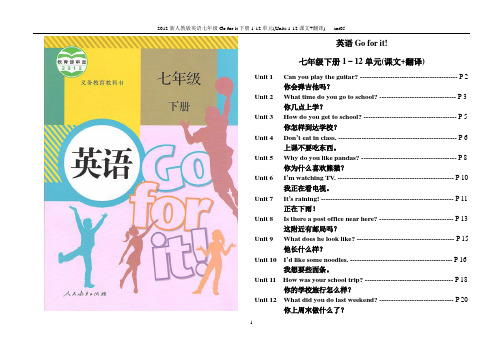
英语Go for it!七年级下册1 – 12单元(课文+翻译)Unit 1 Can you play the guitar? ------------------------------------------ P 2你会弹吉他吗?Unit 2 What time do you go to school? --------------------------------- P 3你几点上学?Unit 3 How do you get to school? ---------------------------------------- P 5你怎样到达学校?Unit 4 Don’t eat in class. --------------------------------------------------- P 6上课不要吃东西。
Unit 5 Why do you like pandas? ----------------------------------------- P 8你为什么喜欢熊猫?Unit 6 I’m watching TV. -------------------------------------------------- P 10我正在看电视。
Unit 7 It’s raining! --------------------------------------------------------- P 11正在下雨!Unit 8 Is there a post office near here? -------------------------------- P 13这附近有邮局吗?Unit 9 What does he look like? ------------------------------------------ P 15他长什么样?Unit 10 I’d like some noodles. -------------------------------------------- P 16我想要些面条。
人教新目标版七年级英语下册Unit2WhattimedoyougotoschoolSectionAGrammarFocus_3c教案新版
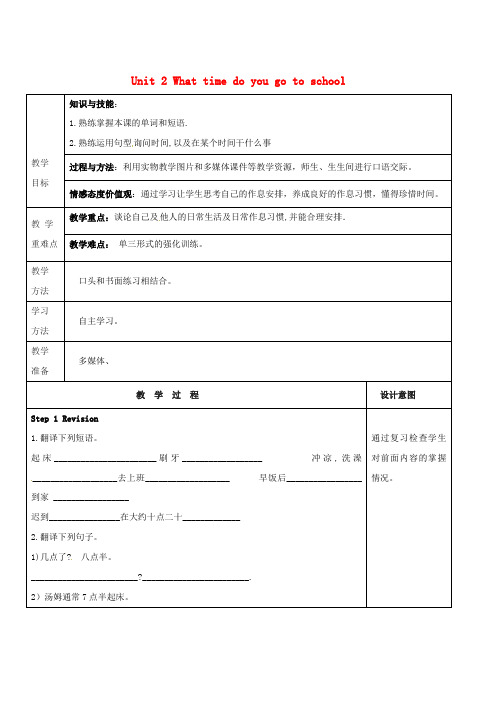
1.自主完成3a,生生相互纠错、改正。
2.Write about something you always do,something you usually do and something you never do.
Step 3.课堂练习
I usually _______(起床)at _______. I have milk and bread for breakf ast. After breakfast, I _______(洗澡)and then I _______(上学)by b us. I get to school at _______ I have five classes in the morning. And then I have lun ch at ________. In the afternoon I have two classes. I _______(回家)at _______. I get home at 4:30 p.m. I _______(吃晚饭)at about _______. After dinner, I _______(做作业). I _______(睡觉)at _______. My life is busy but not excitin g.
3)我通常七点五十的洗澡。
I ______ go ________ work ________ eight--thirty.
4)Scott什么时候去工作?
________ ________ Scott ________ ________ ________?
5)他们通常在周末锻炼。
They usually __________ __________ ________ .
新目标版英语七年级下册Unit2Whattimedoyougotoschool?(SectionA)含答案

新目标版英语七年级下册Unit 2 What time do you go to school?(Section A)一、根据句意及首字母提示完成句子1、根据句意及首字母提示完成句子(1)Tom is very young. He can't get d________ by himself(他自己).(2)Jim is seven years old. He can b________ his teeth in the morning.(3)—What's ten and thirty?—It's f________.(4)I always get up e________. I never get up late.(5)There are many(许多的)buses(公共汽车)at the bus s________.二、用所给词的适当形式填空2、用所给词的适当形式填空(1)—What time do you usually________ (eat) breakfast?—At seven thirty.(2)“That's a ________ (fun) time for breakfast.(3)________ (Lily) family has a cat. It's very interesting.(4)Jim usually ________ (do) his homework after school.(5)He ________ (brush) his teeth after he gets up every morning.三、从方框中选择合适的单词并用其正确形式完成句子3、从方框中选择合适的单词并用其正确形式完成句子(1)What do you ________ do on Sundays?(2)I ________ walk to school when it's sunny.(3)My father gets up early every day, so he is ________ late for work.(4)The sun(太阳) ________ rises(升起) in the east(东方) and sets in the west.(5)Tina finds a good ________. She ________ very hard (努力地) every day.(6)Mary wants to be a singer. She thinks it's an interesting ________.四、单选题4、Li Ming is the best student in our class. He __________ gets good grades(成绩).A、alwaysB、sometimes(有时)C、neverD、often5、Cathy was born blind(天生是盲的), so she has __________ seen our beautiful world.A、oftenB、sometimesC、seldom(很少)D、never6、My father, Mr. White, often __________ at six twenty in the morning.A、get upB、go upC、gets upD、go to bed7、Kate takes a shower at 8 o'clock in the evening.(替换画线部分)A、playsB、lovesC、hasD、brings8、—Do you like this movie?—Yes, it's the __________ one I've ever seen(曾经看过的).A、betterB、bestC、goodD、well9、—When do you go to school?—We go to school __________ Monday __________ Friday.A、on; toB、from, toC、in; andD、in, to10、Could I have an early morning call __________ six o'clock tomorrow(明天) ?A、onB、toC、atD、in11、The child doesn't need any help. He is old enough to __________ himself.A、put onB、wearC、dressD、take care12、__________ your father __________ watching TV in the evening?A、Does, likesB、Does, likeC、Is; LikesD、Do, likes13、Susan __________ her homework at school every weekend.A、don'tB、don't doC、doesn'tD、doesn't do五、按要求改写句子14、按要求改写句子(1)He wants to know about my weekend.(改为一般疑问句并作否定回答)________ he ________ to know about your weekend?No, he ________.(2)She goes to school at seven thirty.(改为否定句)She ________ ________to school at seven thirty.(3)She often has dinner at half past six in the evening(对画线部分提问)________ ________ does she often have dinner in the evening?(4)I take a shower at 8:00 in the morning.(对画线部分提问)________ ________ you ________ a shower in the morning?(5)I usually learn English at eight on the radio.(用he代替I改写句子)He ________ ________ English at eight on the radio.六、根据汉语完成句子15、根据汉语完成句子(1)—你几点钟锻炼?—我通常五点五十锻炼。
2012【新】人教版新目标七年级下英语Unit_2_What_time_do_you_go_to_school__练习题含答案
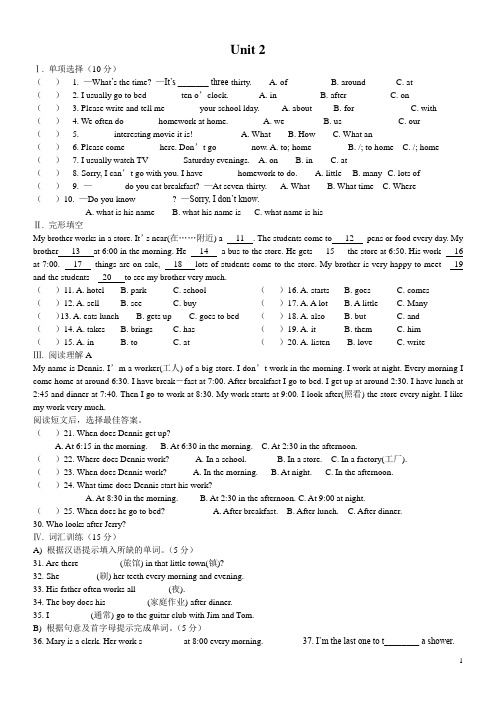
Unit 2Ⅰ. 单项选择(10分)() 1. —What’s the time? —It’s _______ three-thirty. A. of B. around C. at() 2. I usually go to bed _______ ten o’clock. A. in B. after C. on() 3. Please write and tell me _______ your school lday. A. about B. for C. with() 4. We often do _______ homework at home. A. we B. us C. our() 5. _______ interesting movie it is! A. What B. How C. What an() 6. Please come _______ here. Don’t go _______ now. A. to; home B. /; to home C. /; home()7. I usually watch TV _______ Saturday evenings. A. on B. in C. at()8. Sorry, I can’t go with you. I have _______ homework to do. A. little B. many C. lots of()9. —_______ do you eat breakfast? —At seven-thirty. A. What B. What time C. Where()10. —Do you know ________? —Sorry, I don’t know.A. what is his nameB. what his name isC. what name is hisⅡ. 完形填空My brother works in a store. It’s near(在……附近) a 11 . The students come to 12 pens or food every day. My brother 13 at 6:00 in the morning. He 14 a bus to the store. He gets 15 the store at 6:50. His work 16 at 7:00. 17 things are on sale, 18 lots of students come to the store. My brother is very happy to meet 19 and the students 20 to see my brother very much.()11. A. hotel B. park C. school()12. A. sell B. see C. buy()13. A. eats lunch B. gets up C. goes to bed ()14. A. takes B. brings C. has()15. A. in B. to C. at ()16. A. starts B. goes C. comes ()17. A. A lot B. A little C. Many ()18. A. also B. but C. and ()19. A. it B. them C. him ()20. A. listen B. love C. writeⅢ. 阅读理解AMy name is Dennis. I’m a worker(工人) of a big store. I don’t work in the morning. I work at night. Every morning I come home at around 6:30. I have break-fast at 7:00. After breakfast I go to bed. I get up at around 2:30. I have lunch at 2:45 and dinner at 7:40. Then I go to work at 8:30. My work starts at 9:00. I look after(照看) the store every night. I like my work very much.阅读短文后,选择最佳答案。
(完整版)新版新目标英语七年级下册unit2知识点总结

Unit 2 What time do you go to school?Section A1.get dressed 穿衣服表示穿的动作be dressed in+颜色/衣服穿着表示穿的状态2.brush one’s teeth 刷牙brush n 刷子brushes v 刷take a shower=have a shower 洗澡3.(1)what time 几点问具体时间,一般回答要具体到小时(2)when对时间提问,询问日期、月份、年份,回答既可是具体的时间,也可是不具体的时间,in the morning,last year,in 1998 等范围大的时间,When does he take a shower?他什么时候洗澡?He takes a shower in the morning. 他在早上洗澡。
I take a shower at 6 o’clock in the morning.我早上六点洗澡。
4.at in on(1)at + 具体时间点,在几点(几分)固定搭配at 7:00 at night at noon(2)in + 时间段(周,年份,月份,季节,早中晚)in 1942 in the morning in May(3)on + 星期/日期/节日或具体某一天的早中晚on a cold winter night on Children’s Day on Monday5. always usually often sometimes 频度副词,常用于动词be 助动词或情态动词之后,行为动词之前。
(1)always(100%) 总是、永远,表动作重复,状态继续,中间没间断,通常修饰动词的一般时态。
若修饰进行时,则有“老是”,“再三地”的意思,带有厌烦、不满、赞美等感情色彩。
(2)usually(80%)通常,着重表示已习惯的动作。
反义词unusually(3)often(60%)时常、经常,表示常常这样,但不总是这样,反义词seldom(4)sometimes(30%)有时、不时,说明的是偶尔发生的事情或情况。
人教新目标Go For It!(2012)初中英语七年级下册Unit 2 What time do

学习目标
1.知识与技能:熟悉掌握单词及句型
2.过程与方法:学时间表达法并进行交际
3.情感态度价值观:能听懂听力并能对根据听力对话进行自由交际.。
学习重点
1.学会22个单词。
2.学会拼写单词,时间表达法的应用。
2.根据3b练习
五、训练检测, 补救达标
I用所给词的适当形式填空
1.Whatyou usuallyon Sunday?(do )
2.Idon’t watch TV on school( day).
3.Peter and Samlate for English class today. ( be)
4.I have muchto do this afternoon .( work)
I usually get up at six thirty.
学习过程
一、课前预习
单词
1 哇2从不
3 早的4 五十
5工作,职业6工作
7电视台, 车站
8 广播电台9…点钟
10晚上
11奇怪的,滑稽可笑的
12锻炼,练习
三、合作探究
师生合作完成2d
1.组内交流
2.小组互检
四、汇报展示,质疑精讲
1.汇报交流2d 的内容
用法(2)钟点的倒读法:
① 前半小时的读法:分钟数 +past +点钟数;30分钟用half ;15分钟用a quarter
如:8:14 读作fourteen past eight
8:30 读作 half past eight
8:15 读作 a quarter past eight
- 1、下载文档前请自行甄别文档内容的完整性,平台不提供额外的编辑、内容补充、找答案等附加服务。
- 2、"仅部分预览"的文档,不可在线预览部分如存在完整性等问题,可反馈申请退款(可完整预览的文档不适用该条件!)。
- 3、如文档侵犯您的权益,请联系客服反馈,我们会尽快为您处理(人工客服工作时间:9:00-18:30)。
七年级下册Unit 2 What time do you go to school?测试题班级姓名得分I. 单项选择(每小题1分,共15分)( )1. —____ do you eat dinner on weekends?—At home. I usually have it with my family at 7:00 pm.A. WhenB. WhatC. WhoD. Where( )2. —What do you do on Sunday afternoons? —I ______ watch TV.A. usuallyB. soonC. thenD. around( )3. Li Ping watches TV for __________ hour every day.A. aB. anC. theD. /( )4. I want to go to the Grand Hotel but I’m lost. Where can I ______ a bus?A. buyB. sellC. takeD. bring( )5. ______ funny time to play table tennis!A. WhatB. HowC. How aD. What a( )6. Do you know what his job ______?A. doesB. beC. doD. is( )7. —What do your parents _______ do after dinner? —They take a walk.A. likeB. help toC. loveD. love to( )8. —______? —It’s three o’clock.A. What time is itB. What day is itC. How much is itD. When do you usually get up ( )9. —What’s her ______? —She is a teacher. She has a lot of _____ to do.A. work; workB. job; jobC. work ; jobD. job; work( )10. Jim often _____ school at 8:00 and _____ home at 17:00.A. gets; getsB. gets to; gets toC. gets; gets toD. gets to; gets( )11. Monica, please _______ me how to spell "weekend".A. showB. thinkC. tellD. speak( )12. My brother often goes to school ______ 7:00 ______ the morning.A. at; inB. in; atC. at; onD. in; on( )13. ______ you a very good time here.A. WishB. WantC. LikeD. Teach( )14. My good friend, Mary is in America. I often write to ______.A. meB. herC. themD. you( )15. —How can I go to your school? —______.A. You can walk there with meB. You can take the red sweaterC. You can afford itD. You can buy it for fifty yuan eachII. 完形填空(每小题1分,共10分)Today is Monday (周一). We have a(n) 16 class in the morning. It 17 at 8:30, but I am late (迟到的) for it. I often 18 school at about 7:50, 19 today I get there late. At about nine o’clock I get to the classroom. I’m really 20 . My English teacher, Miss Green is very kind to me. She 21 me in and doesn’t criticize (批评) me. How nice she is!All the students 22 my class like Miss Green. I have many subjects at 23 : math, English, P.E., music, 24 and computer, but I like English 25 . I like my English teacher and I like her classes. I’ll never (不再) get to school late. I’ll get up very early (早) in the morning.( )16. A. math B. art C. music D. English( )17. A. goes B. starts C. shows D. works( )18. A. learn about B. look at C. get to D. work in( )19. A. or B. and C. after D. but( )20. A. sorry B. exciting C. good D. happy( )21. A. likes B. meets C. lets D. joins( )22. A. on B. in C. for D. about( )23. A. store B. home C. school D. party( )24. A. Chinese B. letter C. festival D. action( )25. A. little B. best C. too D. wellIII. 阅读理解(每小题2分,共20分) (A)A:What time do you wake up, Alex? B:I wake up at six o’clock.Activity wake up(醒来) get up brush teeth take a shower Time 6:00 6:35 6:40 6:45Activity have breakfast go to school finish school have lunchTime 7:00 7:15 13:00 13:30Activity do homework have dinner go to bedTime 15:20 19:00 21:30根据图表内容补全下列句子。
26. This is ______’s daily routine (日常生活).27. He gets up at 6:35 am and ______ ______ at 7:00 am.28. He always brushes his teeth at ______ and takes a shower at ______.29. He has ______ classes after 1:00 pm.30. He does his homework in the _____________.(B). In my family, there are my parents, my grandparents, my brother and I. We are a happy family. My father is a teacher. He works in a school. He gets up early and works very hard every day. Sometimes he helps me with my homework. His students love him very much because he likes to help them. My mother is a writer. She doesn’t need to go to work but she writes books, cleans (打扫) the house and takes care of (照顾) us. My grandparents are old. They don’t have jobs. They stay at home every day, reading newspapers (读报) and watching TV. They go to bed early. My brother is a student. He is in my school, too. He likes playing basketball, tennis and ping-pong. I like to play soccer, ping-pong and computer games. After school, we get home early. We do our homework, play sports and help our parents in the evening.( )31. There are ______ people in the family.A. fiveB. sixC. sevenD. eight( )32. My brother is a ______.A. writerB. runnerC. studentD. teacher( )33. My mother works ______.A. in a schoolB. in a hotelC. in a storeD. at home( )34. My grandparents ______.A. help us with our homeworkB. write booksC. don’t have jobsD. don’t like watching TV ( )35. My brother and I both (都) like playing ______.A. basketballB. soccerC. tennisD. ping-pongIV. 词汇运用(每小题1分,共5分) 根据句意及首字母提示,写出所缺单词的适当形式。
